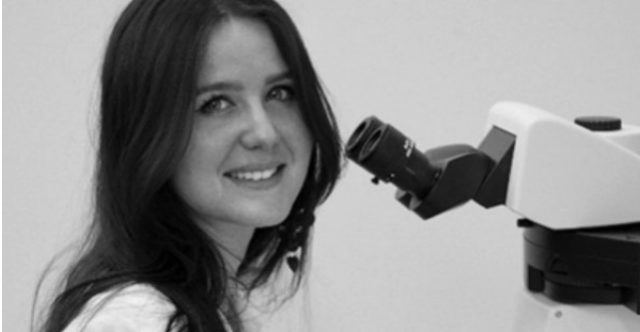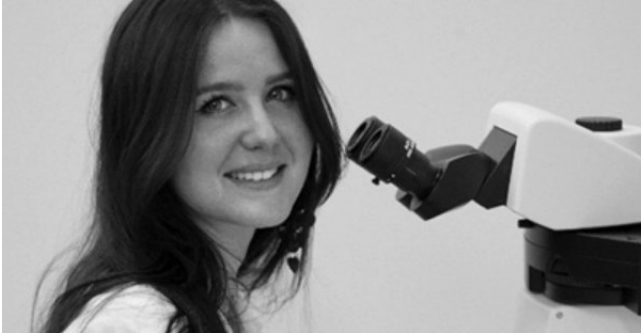Dr Anne Rios on creating one of the world’s most innovative 3D imaging techniques to detect breast cancer – StartupSmart

Dr Anne Rios was awarded the Neil Lawrence prize at the 2016 Centenary Institute Medical Innovation Awards for her project entitled ‘A journey into the unexpected: A 3D view of breast cancer’.
She has developed a new 3D imaging technique that allows scientists to visualise entire breast tissues down to a single-cell level. She is the only researcher in Australia – and one of the few in the world – to do this.
Women’s Agenda sat down with Dr Rios to learn more about her career.
Describe what you do?
“I am a researcher in breast cancer at the Walter and Eliza Hall Institute (WEHI) in Melbourne. I have always been passionate about imaging and filming, which inspired me to develop a novel technique of three-dimensional (3D) imaging to visualise entire breast tissues down to a single-cell level.
“With this technology, I get an unprecedented view of this organ. It has already led to surprising insights into the normal development of the mammary gland.
“Within the scope of breast cancer, I am now using this powerful 3D imaging technique to screen, in close detail, large areas of breast tissue to detect any abnormal cell behaviour that could lead to breast cancer.”
When you left school what did you dream of doing?
“This is a tough question! When I was kid I really loved three things – History, Art and Archaeology. From a young age, I even dreamt of being Indiana Jones!
“When I left high school, (if I’m being honest) I wanted to party with my friends and was over excited to get my independence. Around that time, and after many talks with my parents, I decided to do biology, because it is quite hard to get a job like Indiana Jones these days.
“I thought biology was a good alternative for me. There is so much to discover including how cells organise and communicate with each other to build organs and complex organisms like us – it’s magic!”
How did you get into medical research?
“I have always been artistic in my life and creativity is very important to me.
“So when I started my scientific career I wanted to combine both art and science to visualise the behaviour of cells in physiological condition but also during cancer.
“This is why I decided to develop this 3D imaging technology that allows you to immerse into the cellular architecture of an entire organ in 3D.”
What is the biggest challenge in your work?
“To remain at the leading edge of science! For that, you have to push yourself constantly, you cannot just be happy with what you achieved, you have to think two steps ahead.
“Predict your future achievement, bet on it and fight for it without knowing if it is going to be successful.
“You have to believe in your ideas and that they will bring you closer to your goals, which in my case is to gain a better understanding of how breast cancer develops to offer potential avenues for new treatments.”
Describe an average work day
“First up coffee, it helps me to plan the day ahead. I am a quite spontaneous person so I always try to have a list of priority tasks that I must complete but for the rest of the day I go with the flow.
“I have lots of discussions with fellow scientists over projects, this is an important part of my day as it allows me to stay open to other ways of thinking, to argue and organise my ideas, but also challenge them.
“It is a part of my job I really enjoy.”
Best career advice you’ve received?
“The best advice I have received came from one of my friends. His favourite quote is ‘Don’t panic’.
“I think it is great advice for life – no matter what happens, don’t panic, put things into perspective, do your best and you will be alright!
“In tough situations, I remind myself not to panic, and it helps me to laugh, relax and get a handle on the situation.”
Who are the people who have helped you on your career path?
“First, my parents, for all the love they gave and for making me feel special. It really helped me to build my confidence.
“Secondly, if I had to cite one person, it would be my PhD supervisor. He has been a very important influence in my scientific career.
“When I started science I was very passionate and fascinated by everything I could observe under a microscope but I was also all over the place.
“He supported me by first believing that I could achieve great things, then by helping me to focus my attention, while still keeping my enthusiasm. This advice helped shape me into the scientific researcher I am today.”
Any advice for other women looking to develop a career in science?
“Dream big, be yourself and don’t overthink the consequences!”
Georgina Dent is a contributing editor at Women’s Agenda. She began her working life as a lawyer before building a career in journalism as an editor, reporter and recognised advocate for women.
This article was originally published on Women’s Agenda.
Follow StartupSmart on Facebook, Twitter, LinkedIn and iTunes.

